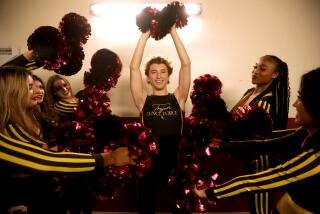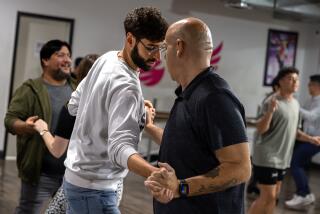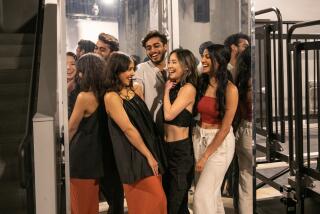Monitor
Maybe you’re just crazy about Irish step dancing, but you have a low threshold for the bravado posturing and many electronic effects of “Riverdance.” Then you would definitely take to Trinity Irish Dance Company, which made a timely St. Patrick’s Day appearance at UCLA’s Royce Hall.
This Chicago-based, Irish American troupe of 20 dancers and three musicians was founded in 1990 by artistic director Mark Howard--a man who must surely wince when he hears anyone refer to his genre as “riverdancing.”
What the two shows have in common is their status as “parallel traditions,” meaning they’ve theatricalized a traditional dance form but still have strong ties to it. With Trinity, the dancing takes precedence over spectacle, and even when some of the contemporary fusion pieces didn’t work Saturday night, the show had a friendly appeal.
Howard’s group pieces (mostly for the women) are strongest. The lively “Step About” and “The Dawn” (co-choreographed by Richard Griffin) made good use of shifting lines and circles that had rhythmic force and fell into satisfying patterns like pieces in a kaleidoscope. Occasional solos--one by Shannon Malee and a few by the two men, Darren Smith and Joe Smith, showed singular artistry.
Two recent pieces by dance-makers from the modern/postmodern world showed how hard it is for Irish dancers to cross over--and for choreographers to know where to lead them. Sean Curran’s “Curran Event” was a sort of playground romp combining Irish details with game-like stamping and clapping. With mini-kilts and ponytails bobbing, dancers also used their arms to imitate their legs, a gimmick that didn’t seem worthwhile. The piece showed little influence from Curran’s years with the Bill T. Jones/Arnie Zane Dance Company, and much more from his tenure with “Stomp.”
While sophisticated and commanding in their own form, the three company women in Ashley Roland’s “Hibernia” looked lost in modern dance lyricism--not at all helped by aqua spandex unitards with feathery fringe. “Unmoored” is the term that comes to mind. When Howard experiments, it’s with details the dancers can master--arms springing into exacting geometrical semaphore, for instance.
Music and a bit of affable emceeing came from the three musicians at floor level. They accompanied some of the dancing, played a few interludes and made sure the audience knew how grateful the performers were that they had torn themselves away from the pub to come to the theater.
More to Read
The biggest entertainment stories
Get our big stories about Hollywood, film, television, music, arts, culture and more right in your inbox as soon as they publish.
You may occasionally receive promotional content from the Los Angeles Times.










